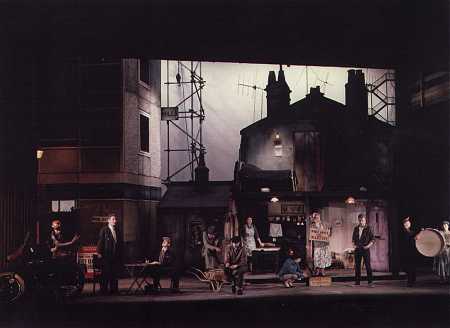Never Had It So Good
(Role: Lennie Breeds)
Coventry /Feb. 29.
When a writer takes it into his head to launch a
devastating attack on certain aspects of a group or an institution his
enterprise is seldom greeted with more than a surly pretence of, "being able to
take a joke against oneself as well as the next man."
Enthusiastic collaboration is the last thing one
would expect, and therefore it is initially something of a surprise to find
that on the programme of Mr. John Wiles's Never Had It So Good, which
received its premiére at the Belgrade Theatre, Coventry, last night,
"the help and cooperation of many organizations and individuals within the
city" are enthusiastically acknowledged and that the set has been designed
Coventry's City Architect, Mr. Arthur Ling. For the play had been announced as
an attack on the present state of Coventry, giving an anything but flattering
picture of life in a booming industrial city, and yet not only had
collaboration been forthcoming from all sorts of official and semi-official
organizations but last night a houseful of Coventry dwellers applauded the play
to the echo.
One reason, no doubt, is that it presents the sort of
criticism that comfortably-situated middle class people like to hear, waxing
angry at the soullessness of a working class confronted with new prosperity
beyond their wildest dreams, but even if it does not carry its criticism far
enough to disturb its audience, at least it does criticize things which give
many fair-minded people pause, and does so with some liveliness and humour.
The play is built on two dualities. One, the
physical, is evident as one comes into the theatre - on the left of the stage
is the towering scaffolding of the new Coventry, on the right the mouldering,
half demolished remains of the old. The other, more psychological, is that
between the two principal groups in the cast - the Gnobe and Briggs families.
|
The Briggses* are the happy barbarians who have
never had it so good - plenty of money because father is working nights, and
not a thought in their heads - while the Gnobes are victims of the bomb -
derelicts from London in search of a no-good father and in danger of losing
what ideals and worthwhile values they have left in the glow of Coventry's
lights, ("ideals frying," says Mr. Skin, the philosophical bystander.)
Should the two dualities be aligned - new
buildings and no ideas, slum houses and humanity? |
 |
So Mr. Wiles sometimes seems to suggest - "high wages
and better working conditions: that's what they come for. But what do they do
for happiness?" - but apparently not, for the author does see hope in a
readiness to rebel, to build the future, putting something of oneself into it
instead of just passively taking what is offered. And in arguing out his
position he rises at times to a fantasticated eloquence somewhere between
Under Milk Wood and The Dog Beneath the Skin.
Other assets are a large and well-chosen cast, Mr.
Ling's evocative set, and the direction of Mr. Bryan Bailey and Mr. Richard
Martin, which keeps things moving along briskly and neatly underlines the local
jokes.
* Breeds family - in both reviews the critic
stated 'Briggs' family.
From our Special Correspondent.
Coventry, Feb. 29.
Printed in The Times, 1.3.60.
Never Had It So Good
From productions associated with Theatre Workshop one
has come to expect, at least, a generous sympathy with the working class, its
splendours and miseries, and so the latest production at the Theatre Royal,
Stratford, Never Had It So Good, comes as something of a surprise - and
not, all things considered, a very pleasant one.
This play by Mr. John Wiles was first staged at the
Belgrade Theatre, Coventry, last week, and concerns the life of workers and
drifters about to move from the slums of the old Coventry to the towering flats
of the new. Exactly in what light Mr. Wiles intended to show his characters is
difficult to divine. One suspects that they were meant to represent humanity at
large losing its individuality and ideals in the empty, inhuman mechanism of
life in a new city. But in his eagerness to get in as many jabs as possible at
the objectionable aspects of city life he has deprived his characters of the
one positive virtue they had - their surging, unlimited humanity - by reducing
them to puppets mouthing slogans. Consequently the playwright's attack appears
to be directed not at his characters' situation, but at the characters
themselves.
In the Stratford presentation the production's detail
has been sharpened, and the symbolic value of Mr. Arthur Ling's splendid set
diminished on the smaller stage. Miss Eileen Beldon as the struggling immigrant
from London comes nearest to creating a believable and sympathetic character
with some thoroughly unlikely dialogue, and among the younger people Mr. Brian
Tipping and Mr. Alan Howard are excellent as young men going wrong. But they
are all working against heavy odds which prove too much for other capable
performers in the cast.
The Times, 9.3.60.
Back to Coventry Reviews
page
